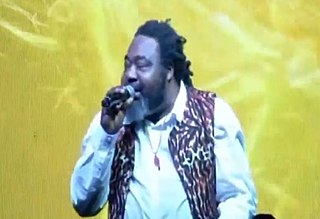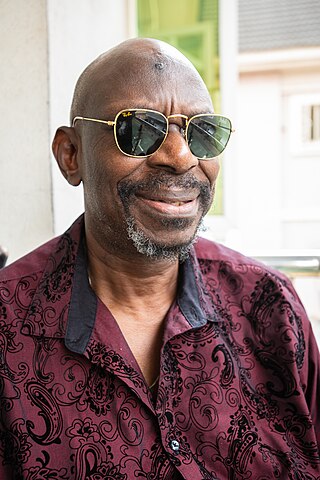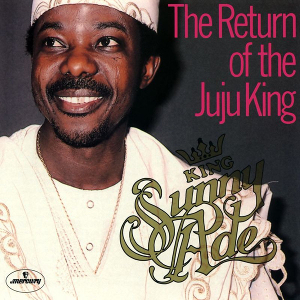The Grammy Award for Best Reggae Album is an award presented at the Grammy Awards, a ceremony that was established in 1985 and originally called the Gramophone Awards, to recording artists for quality works in the reggae music genre. Honors in several categories are presented at the ceremony annually by the National Academy of Recording Arts and Sciences of the United States to "honor artistic achievement, technical proficiency and overall excellence in the recording industry, without regard to album sales or chart position".

The music of Nigeria includes many kinds of folk and popular music. Little of the country's music history prior to European contact has been preserved, although bronze carvings dating back to the 16th and 17th centuries have been found depicting musicians and their instruments. The country's most internationally renowned genres are Indigenous, Apala, Aurrebbe music, Rara music, Were music, Ogene, Fuji, Jùjú, Afrobeat, Afrobeats, Igbo highlife, Afro-juju, Waka, Igbo rap, Gospel, and Yo-pop. Styles of folk music are related to the over 250 ethnic groups in the country, each with their own techniques, instruments, and songs. The largest ethnic groups are the Igbo, Hausa and Yoruba. Traditional music from Nigeria and throughout Africa is often functional; in other words, it is performed to mark a ritual such as the wedding or funeral and not to achieve artistic goals. Although some Nigerians, especially children and the elderly, play instruments for their own amusement, solo performance is otherwise rare. Music is closely linked to agriculture, and there are restrictions on, for example, which instruments can be played during different parts of the planting season.

Majekodunmi Fasheke, popularly known as Majek Fashek was a Nigerian singer-songwriter and guitarist. His 1988 album Prisoner of Conscience included the single "Send Down the Rain", which won six PMAN Music Awards. Also known as The Rainmaker, he worked with various artists worldwide including Tracy Chapman, Jimmy Cliff, Michael Jackson, Snoop Dogg, and Beyoncé
Though reggae music first developed in Jamaica, it has strong rhythmic and thematic associations with Africa and has been called "the quintessential African/third world/black musical form". There are many African reggae musicians with a wide fan base both on the continent and abroad. Well-known African reggae artists are Alpha Blondy, Pax Nindi aka Harare Dread, Majek Fashek, Tiken Jah Fakoly, Colbert Mukwevho,Thomani Tshikororo, Ismael Isaac, Radical Dread, Jambo, Soul Raiders, Lucky Dube, and Serges Kassy.

I.D. is an album by the Jamaican band the Wailers Band, released in 1989. Most of the songs were written by Junior Marvin; the band had around 300 songs to consider.

Mek We Dweet is a studio album by the Jamaican reggae singer Burning Spear, released in 1990 via Island Records. The recording sessions took place at Tuff Gong Recording Studio in Kingston. Burning Spear supported the album by touring with Reggae Sunsplash.
Roger Steffens is an American actor, author, lecturer, editor, reggae archivist, photographer, and producer. Six rooms of his home in Los Angeles house reggae archives, which include the world's largest collection of Bob Marley material. Based on these archives Steffens lectures internationally with a multi-media presentation called The Life of Bob Marley. His radio career began in New York City in 1961, and he co-hosted Reggae Beat on KCRW in Los Angeles and was syndicated on 130 stations worldwide in the 1980s.
Redemption song(s) may refer to:

Rymzo born April 23, 1974, in Lagos state is a Nigerian musical recording artist and producer. His music is influenced by many artistes including Fela Anikulapo-Kuti, Jimi Hendrix, U-Roy, I-Roy, Bob Marley, Naughty by Nature, Kool Moe Dee, Shabba Ranks, Tiger, Cocoa Tea, Capleton, Joe Higgs.

Evi Edna Ogholi. is a Nigerian female reggae musician popular for her song "Happy Birthday".

Ras Kimono was a Nigerian reggae artist whose debut album Under Pressure, led by the single "Rum-Bar Stylée", was a big hit in the Nigerian music scene in 1989. Before he released his solo album, he was in a group called The Jastix along with Amos McRoy and Majek Fashek.
Otu Udofa, professionally known as Lemmy Jackson, is a Nigerian music producer who produced songs for many prominent Nigerians artists of the 1980s. He produced Wait for Me a duet by Onyeka Onwenu and King Sunny Adé, he also worked with Alex O, the Mandators, Tera Kota and Ras Kimono.

Tunde Alabi-Hundeyin is a Nigerian television and film producer, director and screenwriter. He is the founder/CEO of Dudu Productions, the television production company which produced the first commercial music video in Nigeria. He has since produced a number of Nigerian music acts, including Sir Shina Peters, Sonny Okosun, Majek Fashek, Onyeka Onwenu and K1 De Ultimate. He produced and directed box office hits like Iyawo Alhaji and Ami Orun, including Ireke Onibudo, which predates Nigeria's Nollywood.

Toots in Memphis is an album by the Jamaican musician Toots Hibbert. Released in 1988, Toots in Memphis was recorded without the Maytals. The majority of the album's tracks are covers of American R&B songs.

Too Wicked is an album by the British band Aswad, released in 1990.

There's Room for Us All is the second album by the American musician Terrance Simien, released in 1993. It was recorded with Simien's band, the Mallet Playboys. Simien supported the album with a North American tour.

Look at Love is an album by the Jamaican musician Judy Mowatt, released in 1991. Mowatt supported the album with a North American tour.

The Return of the Juju King is a compilation album by the Nigerian musician King Sunny Adé, released in 1987. It was his first album after being dropped by Island Records. Adé supported the album with a North American tour that featured a 15-member version of his band, the African Beats.













